Opinion

But Jesus said, if you would be perfect, go, and stop pretending racism doesn’t exist, stop supporting political leaders who lie and manipulate, stop being co-opted by political agendas, and stop slandering people who are different from you.
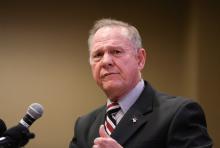
President Trump and the Republican National Committee, on the other hand, are supporting an accused child molester for the U.S. Senate. It is as if the Catholic bishops were promoting a child abuser for bishop.

The Darkest Hour raises uncomfortable questions about the nature of war and what justifies military action. We see the sacrifice of 4,000 British soldiers at Calais in order to rescue the 300,000 British Expeditionary Forces at Dunkirk. It is an agonizing moment, a devastating sacrifice. In May of 1940, none of those leaders and soldiers had any idea that those casualties were not a complete waste of human life, that were it not for Britain’s refusal to surrender and agree to terms with Hitler that world events could have taken an even darker turn.

These are the times in which we now live. The turbulence of this year has left many of us feeling buffeted by constant storms in politics, society, and nature. Amid this daily chaos, fear, and pain, one thing is clear: The role of faith leaders across society is more important than ever. Our call and our ministry requires us to stay radically rooted.

Peacemaking isn’t a passive withdrawal from conflict — it’s an intentional movement toward it with tools to understand, heal, and transform. It’s time for Christians across the U.S. to engage in this conflict in a helpful, curious way. I know there is a lot of confusion and complexity around this and, for the sake of my friends (Jews, Christians, and Muslims) in the region, as well as our collective wellbeing, I feel compelled to offer a few brief observations on today’s announcement by President Donald Trump on the U.S. embassy and the status of Jerusalem as the capitol.
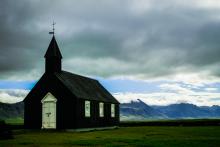
This Christmas season, we need to remember that Jesus was not white. And in solidarity with that truth, we need to make space in our Advent season for the church to openly lament that American Christianity has often stood on the side of the oppressor and not on the side of the oppressed.

If you were of age in 1993, you don’t need to be reminded who the Branch Davidians were and what the Federal Bureau of Investigation did to them on April 19th of that year.
For newcomers to the scene, these “Davidians” were well-known for their extremist activities in Waco, Texas. They were a typical “cult” during a decade in which intense and isolated religious groups were a threat to their neighbors, the relatives of their members, and the public at large. In that April incident, the FBI, urged by public opinion, set out to discipline them and prevent them from creating public disturbances. Yet, create a disturbance they did.

As a woman who attended Catholic school for 16 years of her life, Lady Bird is possibly the most relatable movie of the year. Lady Bird could have added the subtitle “inspired by true events” and I would have asked myself which person from my hometown sold the rights to their life story to Greta Gerwig.

This has been a devastatingly difficult year for many of us, to say the least — even for those of us whose homes and families haven’t been directly hit by any of the ongoing wars, natural disasters, or the reckless actions of the current president. Around this time last year, many in our country were insisting we needed to withhold judgment and give #45 a chance. While some church leaders led us in lament after the election, too many in our churches urged us to “wait and see.” More than 10 months in now, we’ve had time enough to witness more grievous offenses than we thought were possible from anyone in that office within such a brief period.
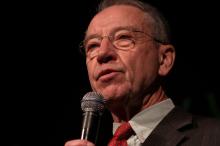
When Sen. Chuck Grassley (R-Iowa) accused the non-rich of squandering their money on “booze or women or movies,” my progressive friends quickly denounced him, as they should. Sen. Grassley is clearly suffering from the senility of a political dogma long past its freshness date. But me, I kept my mouth shut.
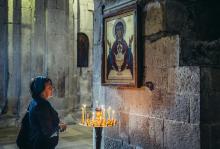
Let’s use this Advent — the season that starts with one woman’s courageous voice — to pay closer attention to all the female voices in our world. Let’s honor them and hear God still speaking to all of us through them.
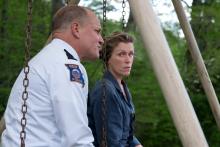
Mildred rents the three billboards down the road from her house to cover with messages shaming the local police chief, Willoughby (Woody Harrelson) in hopes of galvanizing the department into action. She merely irritates the sympathetic Willoughby, but infuriates Dixon (Sam Rockwell), a dim officer with racist and homophobic tendencies and an anger management problem. As tensions escalate and anger begets violence (which begets more violence), Mildred and Dixon are each forced to address the deeper issues inside them that fuel their actions.
1. Christians Arrested Reading Scripture in Senate Office Building
Powerful video of 12 Christian leaders arrested in the Hart Senate Building while reading from the #2000verses in the Bible on poverty and justice, speaking out against the GOP Tax Bill.
2. Great Injustice Calls for Great Action
“… this milestone bill will determine social outcomes for many years to come. Its passage will create a complete shift in the social safety net as we have known it, and it will signal a change that government will no longer care for the needs of the poor — the criteria that the biblical prophets demand of all those who rule.”
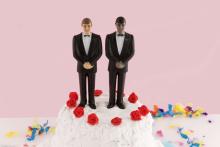
Further complicating matters, the Supreme Court has changed its position over time. Its evolving interpretations show how religious freedom debates create shifting categories of winners and losers.
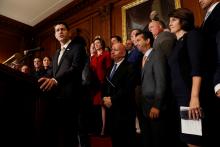
This week, the U.S. Senate is set to vote on the Republican tax bill, following the House vote on a similar bill earlier this month. The proposed plan in the Senate is very complicated and it is being rushed through the political process with little time to consider it and draw public attention to it. But this milestone bill will determine social outcomes for many years to come. Its passage will create a complete shift in the social safety net as we have known it, and it will signal a change that government will no longer care for the needs of the poor — the criteria that the biblical prophets demand of all those who rule.

'Coco' functions beautifully as a unifying reminder of the ways family and legacy influence us.
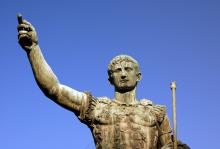
God’s kingdom is a place of unlimited love and unending compassion. It’s a place where everyone is welcomed — especially the marginalized — and nobody is treated like an outcast.
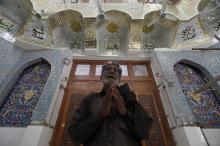
Many Muslims and non-Muslims around the globe celebrate Sufi saints and gather together for worship in their shrines. Such practices, however, do not conform to the Islamic ideologies of intolerant revivalist groups such as Islamic State. On the contrary, IS finds these practices threatening. Here’s why.
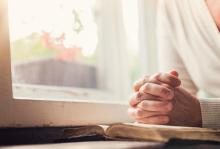
Genuine gratitude brings us humility and reconnects us with God and each other —especially those who need us in some way. It erases our society’s illusions about winners and losers. It directly challenges our judgments about who is deserving and who is undeserving. It reminds us of our total dependence on God for everything.
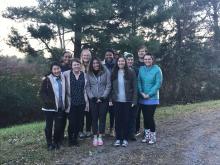
I was the first intern of Cycle 34 to arrive at the Sojourners intern house in Washington, D.C., in August. An incredibly generous staff member picked me up from the airport, drove me the hour back to the house, and left me to settle into my new home (later I learned that this type of generosity was just a part of the job at Sojourners, but that is another story altogether).